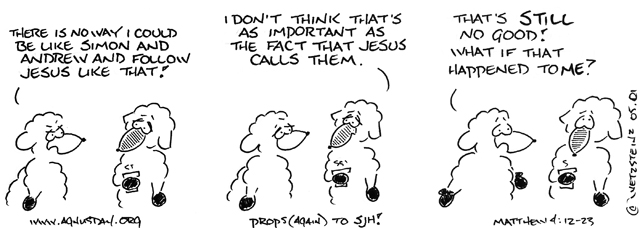Jesus Calls Us
This is the sermon I preached on Sunday, Jan. 22 at St. Timothy Lutheran Church. The text was Matthew 4:12-23.
It’s time for Jesus’ ministry to begin; the turning point being the imprisonment of his cousin, John the Baptist. The time is right.
Jesus moved from Nazareth to Capernaum. If we walked that distance today, it would take between eight and nine hours. Can you imagine the move Jesus must have had? Nazareth is nowhere near Galilee and the landscapes are so different.
When I lived with my young family in Bethlehem, we would often vacation in the north. It was cooler there and such a relief from the desert Bethlehem is in. One such time we visited friends working at a hospital in Nazareth. I’ll never forget how the car climbed and climbed and climbed some more to get to where they lived, in the hospital compound, at the very top of a high hill. And it didn’t look anything like Galilee.
Throughout Matthew’s gospel, actions were to fulfill what was spoken by the prophets. The reason for the move to Capernaum was to fulfill Isaiah’s prophecy, which was read earlier and which Matthew repeats.
Jesus was out for a walk by the lake. His encounter with the first two disciples he calls, Simon and Andrew, was not in the synagogue, but at the lake where they were fishing. They already had something useful and important to do, and were not looking for a new life. They do not seek him; he seeks and finds them. Jesus’ call is intrusive and disruptive, calling them away from work and family. (Boring and Craddock). Jesus came to them where they were.
“Follow me,” was Jesus’ invitation. But he does not literally say, “Follow me” using the Greek word “follow.” He simply says, “Hey, Come on! After me!” “Follow me” makes it sound like Jesus even gave them more instructions than he did. They dropped everything immediately to go after Jesus (Myallis). Immediately they left their nets and followed [Jesus]” (v. 20).
Part of Jesus’ message was, “The kingdom of heaven has come near.” Could the future disciples have felt that in the presence of Jesus? Did their spidey sense tell them there was something unusual about this man, Jesus? The kingdom of heaven had come near.
Jesus also called James and John as he continued his walk. They were working in the boat, mending nets because they were fishermen. Jesus said, “Hey, Come on! After me!” They “immediately” left the boat and their father to follow Jesus. It wasn’t a matter of simply leaving a boat behind, but their father as well.
I wonder what their father, Zebedee, thought. Capernaum wasn’t that big a town. He likely knew who Jesus was. Did he wish he could join his sons in going after Jesus? Was his heart strangely warmed and moved as the kingdom of heaven came near? Or, was he wondering how he could continue the family business? We don’t know.
The brothers’ abrupt departure, their break with fishing and family and their instant acceptance of Jesus’ invitation to “fish for people” underscore the sharp demands of discipleship. The message of God’s reign is not for the cautious (Boring and Craddock).
We have many small family businesses in our area. How would a parent who is planning to pass the business on to a son or daughter feel, if they announce, “Dad! God has called me into the ministry. I’m starting seminary in the fall. Isn’t that exciting?” I’m sure the parent could identify with Zebedee, who may or may not have shared the enthusiasm of his sons.
Jesus calls us in our everyday lives whether we are retired, volunteering or still working. Jesus comes to us, just as he came to his first disciples. His words to us are, “Hey, Come on! After me!” He calls us to go where he goes.
Jesus calls us today to be his hands and feet in this world. Will you be among those packing for 5 and 2 on Tuesday? Do you knit or crochet gloves, scarves or hats for those in need? Will you share with others the encounters you have had with Christ in your life? Tell your story; God’s story.
We have very little control over our own lives, but as fish caught in the net of God's love, we can trust that we are under God's control. We have to believe that being captured by God's love, that responding to the command to repent and die to self, that being raised to a new life by God, is not only right for us, but a message we need to share with the entire world. (Stoffregen)
But to go, we have to hear his voice. We may hear it through the voices of friends, through scripture, or through a song. Listen carefully to the next two songs we will be singing, “Jesus Calls Us O’er the Tumult” and “You Have Come Down to the Lakeshore.” Hear Jesus speaking to you. Let the people of God say, Amen!
Resources
M. Eugene Boring & Fred B. Craddock, The People's New Testament Commentary
Rob Myalllis, lectionarygreek.blogspot.com
Brian Stoffregen, crossmarks.com



Comments